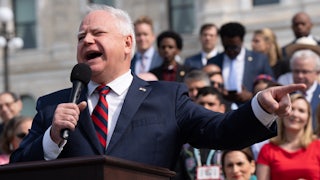Former Ohio House Speaker Larry Householder was sentenced recently to 20 years in prison for orchestrating a $60 million bribery scheme. A day later, Ohio’s legislature essentially created an organization that’s immune from government oversight—in direct contravention of a state Supreme Court ruling two months ago.
State lawsuits against opioid manufacturers, distributors, and retailers are expected to yield more than $50 billion in settlement money to be distributed across the country. Ohio alone will eventually receive more than $1 billion. So in 2021 the state, led by Republican Governor Mike DeWine, created the nonprofit OneOhio Recovery Foundation to distribute the majority of it.
But late last month, the Republican-controlled legislature passed a two-year budget with language stating that the nonprofit foundation is not a public entity. With the stroke of DeWine’s pen on Independence Day, the foundation and 19 regional boards became immune from state bribery, ethics, or open records laws. To put a finer point on it: The use of public money, which was won in lawsuits brought by elected officials, can now be shielded from the public itself.
We’ve been down this road before, with the tobacco settlements, when most of the money was spent on anything but addiction, recovery, and public health in general. Now we’re going down that road again: Fewer than a third of the states have committed to full transparency in spending the opioid money, meaning that those who are most in need of help—people at risk of overdose or substance use disorder—may not even benefit from the lawsuits that were supposedly filed on their behalf.
The memorandum of understanding establishing OneOhio made clear that it would function as a 501(c)3 but be as open and transparent as a government entity. But since first meeting in June 2022, the organization has raised the ire of some public health and grassroots harm-reduction workers, who accuse it of a lack of transparency. When Dennis Cauchon, a former journalist and president of advocacy group Harm Reduction Ohio, was barred from the meeting, he submitted a records request and was denied. Harm Reduction Ohio then sued OneOhio for not abiding by open meetings laws and denying records requests, claiming it was in violation of the memorandum of understanding.
In May, the Ohio Supreme Court ruled unanimously that the board must comply with public records requests. But OneOhio won’t have to do that because after the court’s ruling, as Cauchon told me, “their response was to change the law.” He added, “It’s heaven for elected officials where no one can know what they’re doing. All anyone knows is what they say in press announcements.”
Now, with the language passed in the new state budget, members of the OneOhio board are not considered public officials, and therefore they’re not governed by anti-corruption statutes prohibiting bribery and privileged access to government contracts. And, of course, the organization can distribute hundreds of millions of dollars without any accountability, so the public won’t know of any waste or abuse of the funds.
If history is any guide, the settlement money will indeed be rife with such problems. The $246 billion tobacco settlement in 1998 drowned state governments in mostly unrestricted money, which was spent on things like shipping docks in Alaska, school construction, and golf carts. Less than 3 percent of every dollar is going toward tobacco cessation and smoking prevention.
Many states may be hoping for a similar bonanza from the opioid settlement. According to OpioidSettlementTracker, 15 states have agreed to report 100 percent of their expenditures to the public, 17 states (including Ohio) haven’t committed to reporting anything, and the remaining states (plus D.C.) say they will report only some of their spending.
But there are some key differences between the tobacco and opioid settlements. Eighty-five percent of the latter must be directed to preventing and addressing opioid use disorder. Some states have already allocated money—for better or worse. Rhode Island will use some to support overdose prevention centers, but elsewhere, according to KFF Health News, funds are being used to pay off debt and to buy vans for roadside litter pickup. That’s not nearly as bad as it could get: In West Virginia in 2007, then-Governor Joe Manchin tried to use money from an OxyContin settlement with Purdue Pharma to buy a helicopter.
It’s hard to tell how the money will be spent in Ohio. The ultimate choices will be made by an elite group. The 29-person board of mostly political appointees is all white with the exception of one Black member, a serious oversight in a state with a disproportionate number of overdoses among Black people. Research by Harm Reduction Ohio identified 274 of the 19 regional boards’ members and found that 83 percent are public officials and only 3 percent have “documented lived or shared experience with opioid use and overdose.”
In Ohio, at least 22,899 people have died from overdoses in the past five years. Harm-reduction worker Sharona Bishop, from Hancock County Public Health (northwest of Columbus), believes this money could help the overdose crisis right now—if it’s spent on immediate needs, such as access to low-barrier shelters and harm reduction. “If the money doesn’t go to people who are affected, we’re going to lose more lives,” she said.
Bishop, who is in long-term recovery, doesn’t think those responsible for distributing the settlement funds appreciate the knowledge of people with her experience. Last January, OneOhio invited the public to apply to be on an “Expert Panel” that would provide ideas to the board. But the application clearly targeted folks with multiple degrees and extensive publications and public speaking experience that frontline workers do not often have. Bishop didn’t apply.
Gary Bright, Bishop’s supervisor, told me that he hired her to help run his health department’s harm-reduction program because of her experience with addiction. People like Bishop see and understand what’s happening in ways he cannot, he said.
“The only reason this lawsuit went through is because of people who were harmed, and the [settlement] money should go to them,” Bright said.
Some of it likely will. But how much? We may never know, now that state Republicans have cloaked OneOhio in secrecy.
“It’s implying that our voices don’t matter,” Bishop said.






